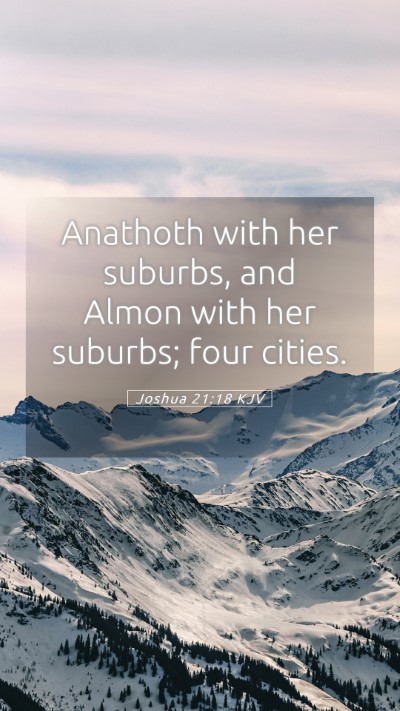Understanding Joshua 21:18
Joshua 21:18 states: "Anathoth with her suburbs, and Almon with her suburbs; four cities." This verse is part of the broader narrative in the Book of Joshua, where the land is being divided among the tribes of Israel. Specifically, it delineates the cities given to the priests from the tribe of Levi. Understanding this verse involves examining its context, purpose, and implications.
Bible Verse Commentary
This verse signifies the allocation of cities designated for the Levites, who were set apart for religious duties. In the comments provided by Matthew Henry, he notes that the allocation of cities was a matter of divine decree, reflecting God's provision for the priests to have a place where they could serve and live among the people. Albert Barnes emphasizes that these cities were chosen strategically; they were spread out to ensure the priestly influence was widespread across Israel, enhancing spiritual leadership.
Contextual Analysis
The context of Joshua 21 relates to the Israelites' conquest of Canaan and the promise that God had made to provide for the Levites. According to Adam Clarke, this allocation is crucial because the Levites did not receive a distinct territory like the other tribes but were given cities within the territories of other tribes. This arrangement facilitated the Levites’ function in performing rituals and educating the people about the law.
The Role of the Levites
Understanding the significance of the Levites is essential for interpreting this verse. Their primary role was to assist the priests, maintain the sanctuary, and instruct the people in God’s laws. The cities they received were termed "cities of refuge," indicating a place of safety for those in need, a concept that resonates with themes of protection and justice in Scripture.
Spiritual Implications
The allocation of these cities reflects God’s commitment to guiding His people. Matthew Henry points out that this provision is a testament to God’s faithfulness, ensuring that spiritual leaders were available to the Israelites. Diverse locations of these Levite cities helped in maintaining spiritual oversight, emphasizing that God desires His word to permeate every aspect of life.
Modern Application
The implications of Joshua 21:18 for believers today can extend into various areas of life. This verse can encourage individuals in Bible study groups to reflect on their roles within their communities, akin to the Levites who were set apart for divine service. Albert Barnes highlights how we might be stewards in our respective territories, sharing our knowledge of Scripture and supporting one another through learning, much like the Levitical cities served their purpose.
In-depth Bible Verse Analysis
- The mention of "suburbs" indicates a community aspect, reminding us that faith is not lived in isolation.
- The number four signifies completeness, suggesting a well-rounded approach to spiritual leadership in the land.
- This allocation reflects God’s organization and plan for His people, reiterating the importance of structure in spiritual undertakings.
Bible Study Resources
The study of this verse can be enhanced through various Bible study tools and resources:
- Bible study guides that focus on the Levitical role and responsibilities.
- Online Bible study platforms that enable discussions about the historical context of cities like Anathoth and Almon.
- Bible study materials that include cultural insights into the Levitical tribe's significance in Israel.
Cross References
- Numbers 35:1-8 - Discusses the cities of refuge for the Levites.
- Deuteronomy 12:12 - Instructions regarding the Levites and their role in Israel.
- Hebrews 7:11-12 - Discusses the priesthood and its transformational nature in light of Christ's sacrifice.
Conclusion
Joshua 21:18 not only serves as a historical record of land allocation but also presents profound lessons for today's believers about divine provision and spiritual responsibility. Through understanding such biblical texts, we grasp the importance of scripture study in cultivating our faith, fostering community, and enhancing our ability to apply God’s word in our daily lives.


